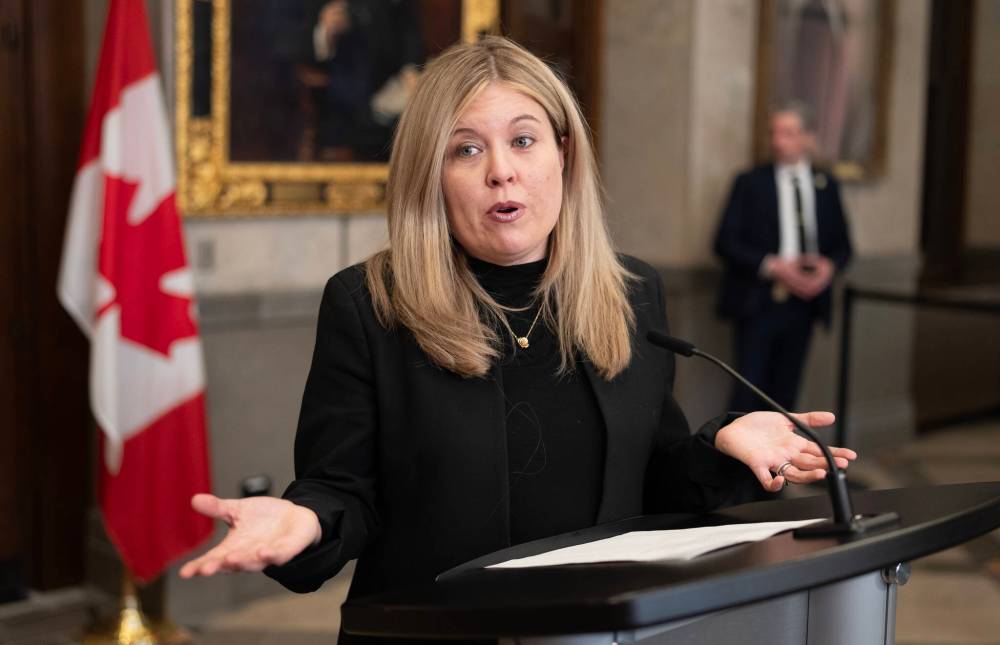Top Stories
Urgent Debate Erupts Over Birthright Citizenship in Canada

UPDATE: An urgent debate has ignited in Canada over the future of birthright citizenship as Conservative MP Michelle Rempel Garner pushes for significant changes to citizenship laws. This controversy follows her recent attempt to amend Bill C-3, legislation aimed at creating a pathway for citizenship for children born abroad to Canadian parents.
While Garner argues the change is necessary to address rising concerns over “birth tourism,” her proposal was swiftly defeated by Liberal and Bloc Quebecois MPs during a session of the House of Commons immigration committee. The proposed amendment sought to restrict automatic citizenship to children with at least one Canadian citizen or permanent resident parent, raising questions about the implications for children’s rights and immigration policy.
The backdrop to this heated discussion is the rising number of temporary residents in Canada, currently estimated at 3 million, making up 7% of the population. Garner claimed that these children are utilizing government services at an alarming rate not accounted for in current planning. However, recent government data indicates the number of non-permanent residents has actually decreased following policy changes implemented last year.
Critics question whether there truly is a crisis. For instance, in 2024, only 1,610 live births were recorded from non-resident mothers, which constitutes a mere 0.44% of the total 367,347 births that year. In fact, the percentage was even lower in 2023 at 0.42%. These figures challenge the notion of an immigration crisis threatening Canada’s healthcare system, as framed by some political narratives.
Federal Justice Minister Sean Fraser has publicly defended the status quo, stating, “I believe that we should maintain birthright citizenship in Canada.” He underscored the importance of equitable citizenship rights, warning against the dangers of selectively granting citizenship benefits.
The debate is further complicated by international perspectives, as countries like Australia, Germany, and the United Kingdom have enacted laws limiting birthright citizenship. In the U.S., former President Donald Trump attempted to curtail birthright citizenship for children of undocumented immigrants through executive orders.
As the discussion unfolds, the political implications are significant. The polarizing nature of immigration issues can drive election outcomes and donations across Canada, suggesting that the birthright citizenship debate is far from over. Garner’s latest efforts may raise the stakes, signaling a potential shift towards greater division and cynicism in Canadian politics.
WHAT’S NEXT: Observers are keenly watching how this debate evolves, especially with the upcoming federal elections. As more voices join the fray, the implications for Canadian values and immigration policy could become even more pronounced. Expect heightened discussions in Parliament and communities across Canada in the days to come.
-

 Politics4 weeks ago
Politics4 weeks agoSecwepemc First Nation Seeks Aboriginal Title Over Kamloops Area
-

 World5 months ago
World5 months agoScientists Unearth Ancient Antarctic Ice to Unlock Climate Secrets
-

 Entertainment5 months ago
Entertainment5 months agoTrump and McCormick to Announce $70 Billion Energy Investments
-

 Science5 months ago
Science5 months agoFour Astronauts Return to Earth After International Space Station Mission
-

 Lifestyle5 months ago
Lifestyle5 months agoTransLink Launches Food Truck Program to Boost Revenue in Vancouver
-

 Technology3 months ago
Technology3 months agoApple Notes Enhances Functionality with Markdown Support in macOS 26
-

 Lifestyle3 months ago
Lifestyle3 months agoManitoba’s Burger Champion Shines Again Amid Dining Innovations
-

 Top Stories2 months ago
Top Stories2 months agoUrgent Update: Fatal Crash on Highway 99 Claims Life of Pitt Meadows Man
-

 Politics4 months ago
Politics4 months agoUkrainian Tennis Star Elina Svitolina Faces Death Threats Online
-

 Sports5 months ago
Sports5 months agoSearch Underway for Missing Hunter Amid Hokkaido Bear Emergency
-

 Politics5 months ago
Politics5 months agoCarney Engages First Nations Leaders at Development Law Summit
-

 Technology5 months ago
Technology5 months agoFrosthaven Launches Early Access on July 31, 2025



















